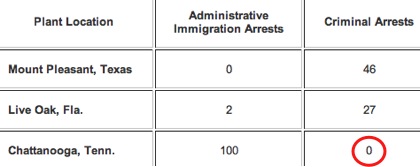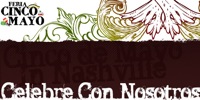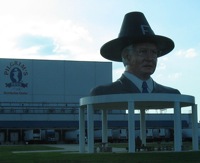
San Antonio headline says "a haven for refugees, immigrants, but tune may be changing"
National columnist ponders bans of taco carts, Spanish-language books
"Americans in name only"
Karl Dean: "There should be no question that we are a welcoming city"The San Antonio Express-News web site MySA.com and nationally syndicated columnist Ruben Navarette both refer to Nashville in recent pieces about immigration. The immigration issue, which is purportedly about the borders, has repeatedly (here, here and here, to name a few) affected the image that Nashville tries to paint for individuals and business looking to visit or relocate to Music City.
The Express-News story points out Nashville's welcoming reputation but wonders aloud if that reputation is at risk with the weaponization of the immigration debate. A Nashville shopowner is quoted as saying that learning the language and following the law will insulate immigrants from animosity, but columnist Navarrette is not so sure. Navarrette focuses on the impact of the immigration debate on Hispanics in general, many of whom are not immigrants. In his column, Navarrette cites at least one and maybe two Tennessee incidents targeting Hispanics in general. The Hispanic Nashville Notebook has documented similar troubling incidents in and around Nashville, in which immigration status is not the sole focus of animosity (see stories here and here).
From MySA.com:
Many foreign newcomers still find Nashville more open to them than other U.S. cities polarized by immigration controversies — but the honeymoon seems to be coming to an abrupt end.
...
In Nashville, it's the opening of places such as Super Mercado Latino, Coco Loco restaurant or Salón de Belleza Internacional that's sparking animosity.
...
One is the Cyber Café, opened four years ago by Gerardo Mendoza. The Mexico City native has lived in Nashville for 14 years — and can't remember a single Hispanic-owned shop when he moved here. He considers it a much better place for immigrants than Houston, where he previously lived.
"Now that there's lots of us, they don't want us here anymore," said Mendoza, 34. "But I don't think it's racism as much as wanting things done right. If you follow the law and learn English, you're fine."
From Navarrette:
You might live in Colorado or New Mexico or Arizona and come from a family that has lived in the United States for several generations. And yet, your citizenship is being challenged by nativists who paint with a broad brush. [Commenters on the Tennessean's recent profile of Ramon Cisneros openly questioned his legal status; those comments and others were later deleted by the Tennessean. -ed.] All they see is your skin color or surname and, from this, they conclude that -- unless you go along with every harebrained scheme to combat illegal immigration -- you're, as one reader recently informed me, "an American in name only." How do you suppose Hispanics will react?
...
Part of the problem is that the right-wingers weren't content to just attack illegal immigrants. They had to attack an entire culture, which is shared by legal immigrants and U.S.-born Hispanics. And so, a discussion that should have been about exactly three things -- improving border security, smoothing the path for legal immigrants, and deciding the fate of 12 million illegal immigrants in the United States -- became about outlawing taco trucks, limiting the number of people in a home, blasting pizza parlors for taking pesos, banning Spanish language library books, and other nonsense.
When Navarrette speaks of outlawing taco trucks, he is speaking of Nashville. He mentioned Nashville specifically in
this previous column on the subject. The reference to bans of Spanish-language books may or may not refer to Middle Tennessee. Nearby Marshall County rejected a local teacher's proposal to eliminate that city's foreign-language collection (story
here).
The negativity against Hispanics in general that Navarrette reveals is a poisonous side effect of
weaponizing the immigration debate, and it wasn't unexpected. See
this earlier story in the Hispanic Nashville Notebook:
At the national and even the local level, there were warnings about the cost of a spiraling negativity towards Hispanics in general in the context of immigration. In 2005, U.S. Representative Jim Cooper (D-Nashville) called on Nashville's business community to "stand up and make a difference, otherwise the debate on this could get out of control in a hurry" (story here). That same year, former Bush White House official Leslie Sanchez warned Republicans against fanning the intensity of immigration politics "into an anti-Hispanic free-for-all" (story here). Acknowledging and apologizing for that free-for-all in Nashville last Saturday was U.S. Senator and presidential candidate Sam Brownback (R-Kansas), who "[asked] a Hispanic man onstage for forgiveness for the negative tone Washington's immigration debate has taken," and said, "'We want you in America. We love you and ask you to forgive us for these negative comments'" (story here).
Early in 2007, Governor Phil Bredesen
condemned the spillover:
"Illegal immigration is bad. It is OK to fight it," he said. "But when that starts slopping over into ‘We’re opposed to anybody who speaks Spanish or we’re opposed to anybody who’s not American-born,’ I think you get into very, very bad territory. And there’s been some of that."
Nashville mayors have consistently promoted Nashville's reputation of hospitality. Former Mayor Bill Purcell said in February 2007, "The great overarching truth in our success in this still new century is that we are a welcoming, inclusive, and friendly people and place." Current Mayor Karl Dean said in October 2007, "There should be no question that we are a welcoming city."
Whether those mayoral statements register outside of Nashville appears to be subject, in part, to ongoing local behavior and speech regarding immigrants and the laws that apply to them, and regarding Hispanics in general.
May we all heed
these Nashvillians' calls to resist negativity, be neighbors and love our neighbors, and speak out instead of being silent.




Photo by
Nick Wheeler. Licensed under
Creative Commons.




 Photo by Liam Ryan. Licensed under Creative Commons.
Photo by Liam Ryan. Licensed under Creative Commons.





 The Nashville Fairgrounds will host a Cinco de Mayo Fair April 30 through May 4.
The Nashville Fairgrounds will host a Cinco de Mayo Fair April 30 through May 4.


 The Chattanooga Times Free Press notes in
The Chattanooga Times Free Press notes in  The Associated Press interviewed Martha Pantoja, a volunteer tax preparer for the non-profit Nashville Wealth Building Coalition. According to
The Associated Press interviewed Martha Pantoja, a volunteer tax preparer for the non-profit Nashville Wealth Building Coalition. According to  The Saturday, April 19, auction of items from the estate of Margaret Lindsley Warden features a portrait of once-famous Nashvillian William Walker.
The Saturday, April 19, auction of items from the estate of Margaret Lindsley Warden features a portrait of once-famous Nashvillian William Walker.